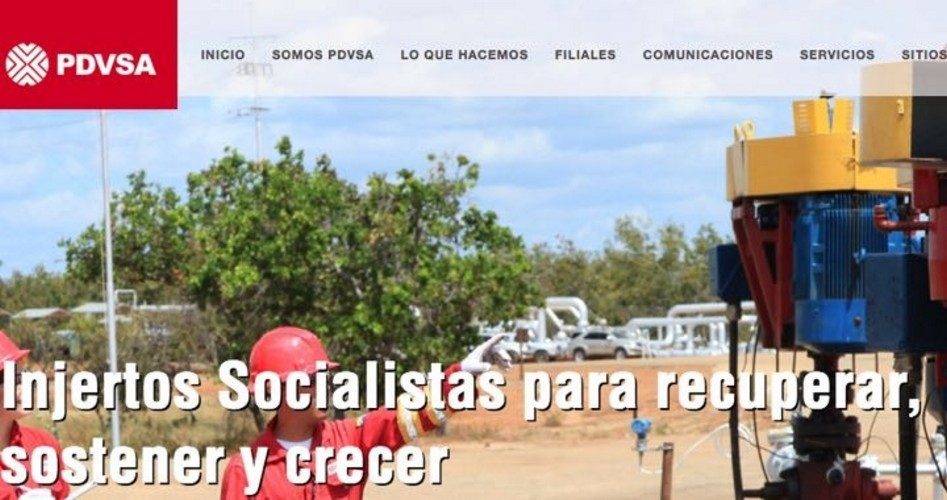
Junior Martinez, 28, has worked in Venezuela’s oil fields for eight years. His salary, denominated in bolivars, today won’t buy anything thanks to runaway inflation, and so he has quit, hoping his credentials as a chemical engineer will get him a job in Brazil: “I got 1,400,000 bolivars a week and it isn’t even enough to buy a carton of eggs or a tube of toothpaste,” he said. His wife and daughter left for Brazil three months earlier.
The same with Carlos Navas, an oil field worker who was once able to support his family well with his income: He owned a car and a house with air conditioning. He is now headed for Ecuador, or Peru: “Before, you worked and you were rich,” he stated. “Your salary bought anything you needed. Now you can’t buy anything, not even food.”
At least they aren’t taking part of the country’s oil company, PdVSA (company ad shown, with caption that says: “Socialist grafts to recover, sustain and grow”). The New York Times reported last week that Martinez and Navas might be the exceptions: “Desperate oil workers and criminals are … stripping the oil company of vital equipment, vehicles, pumps and copper wiring, carrying off whatever they can to make money.” As offices at President Maduro’s state-owned oil company are emptying out, and crews in the field are walking off their jobs without giving notice, company pickup trucks are being stolen, copper wiring is being stripped from vital parts of the company’s electronic and control mechanism, and even motors driving pump jacks in the field are being removed — all in order to sell them on the black market in exchange for food.
This is the personal side of the collapse of Venezuela, as the cancer of collectivism rots away not only the country’s economy but its culture as well.
The New American and others have chronicled the collapse of South America’s once most prosperous country:
PdVSA and Maduro’s government are in default on more than $50 billion in bonds, not having been able even to make interest payments on them since last fall.
ConocoPhillips has just been allowed to seize Venezuelan oil shipments bound for offshore refineries and so PdVSA has been forced to cut its production as its storage facilities are full to capacity.
As a result PdVSA’s production is declining at the rate of 50,000 barrels day and is estimated to fall to less than one million barrels of crude a day, down from more than three million bpd just a few years ago.
Part of PdVSA’s difficulties stem from the company’s inept management and a lack of sufficient cash flow to keep the facility in good repair. As Nick Cunningham noted, writing at OilPrice.com, “Analysts have predicted that Venezuela’s oil situation would deteriorate over the course of 2018, but the descent is happening much faster than most people predicted.”
Also in free fall is the collapse of traffic at Venezuela’s airport. Just since 2014, 15 airlines have ceased operations there. The airport facility, once the pride of the country, has fallen into disrepair: Its terminal is frequently without air conditioning, power, or even running water in the restrooms. The airport’s cleaning services company went bankrupt so there’s no one cleaning the restrooms, mopping the floors or taking out the trash.
Part of the problem is Maduro’s currency exchange controls that prohibit airlines from converting the bolivars they receive for airline tickets into other currencies (dollars, francs, yen, etc.). and so the bolivars just sit in Caracas’ banks, wasting away. The International Air Transport Association (IATA) estimates that airline companies are holding $3.8 billion from ticket sales, which is rapidly becoming worthless in light of the country’s inflation, estimated at 25,000 percent annually.
Part of the problem is airport crime. Since 2017, airport security has been provided by Maduro’s militarized police force, which routinely shakes down passengers before they’re allowed to board. They’re called the “military mafia” and deny boarding to passengers until they fork over cash or valuables.
And not just departing passengers, either. When well-to-do passengers arrive, word goes out to the mafia, who then stops them on the highway from the airport to Caracas, often at gunpoint, and demand payment in cash or valuables before being allowed to proceed.
That has had, one might say, a chilling effect on the travel business at the airport. According to the World Tourism Organization, the number of international visitors to Caracas has declined by a third while the country’s tourism revenue has been cut in half.
Those who can are leaving Venezuela. The Miami Herald estimates that in the last two years alone nearly a million citizens have left Maduro’s failed socialist experiment — some, incredibly, by “walking hundreds of miles on foot through the Andes.”
As reported by The New American last week, Gallup’s 2018 Global Law and Order Index places Venezuela at the very bottom of the 140 nations it surveyed. In other words, those forced to remain consider their country the most dangerous place in the world to live.
Polio has returned to Venezuela after a 30-year absence, while other diseases such as diphtheria, tuberculosis, measles, and malaria are running rampant through the population. This is due to the lack of medical care and medicines, thanks once again to the policies of the Marxist Maduro.
Many Venezuelans, most of whom now live in poverty, are rooting through garbage dumps to find something to eat, while others are seizing the plastic bags the trash is placed in, to sell on the black market.
With the help of criminal networks both inside and outside the unhappy country, young girls are being enticed into prostitution through promises of good pay, and then find themselves sold into sex slavery around the world. Sex trafficking, ghastly as it was in 2016 when the number enslaved was estimated to be 60,000, is now more than three times that number (200,000 estimated this year), and is expected to rise to 10 times that number (600,000 estimated) by 2020, 18 months from now.
Maduro’s cancer of collectivism is eating out the vitals of a once-prosperous country.
An Ivy League graduate and former investment advisor, Bob is a regular contributor to The New American magazine and blogs frequently at LightFromTheRight.com, primarily on economics and politics. He can be reached at [email protected].
Related article:
Sickness — Fiscal, Human, and Cultural — Sinking Venezuela Further Into Darkness



